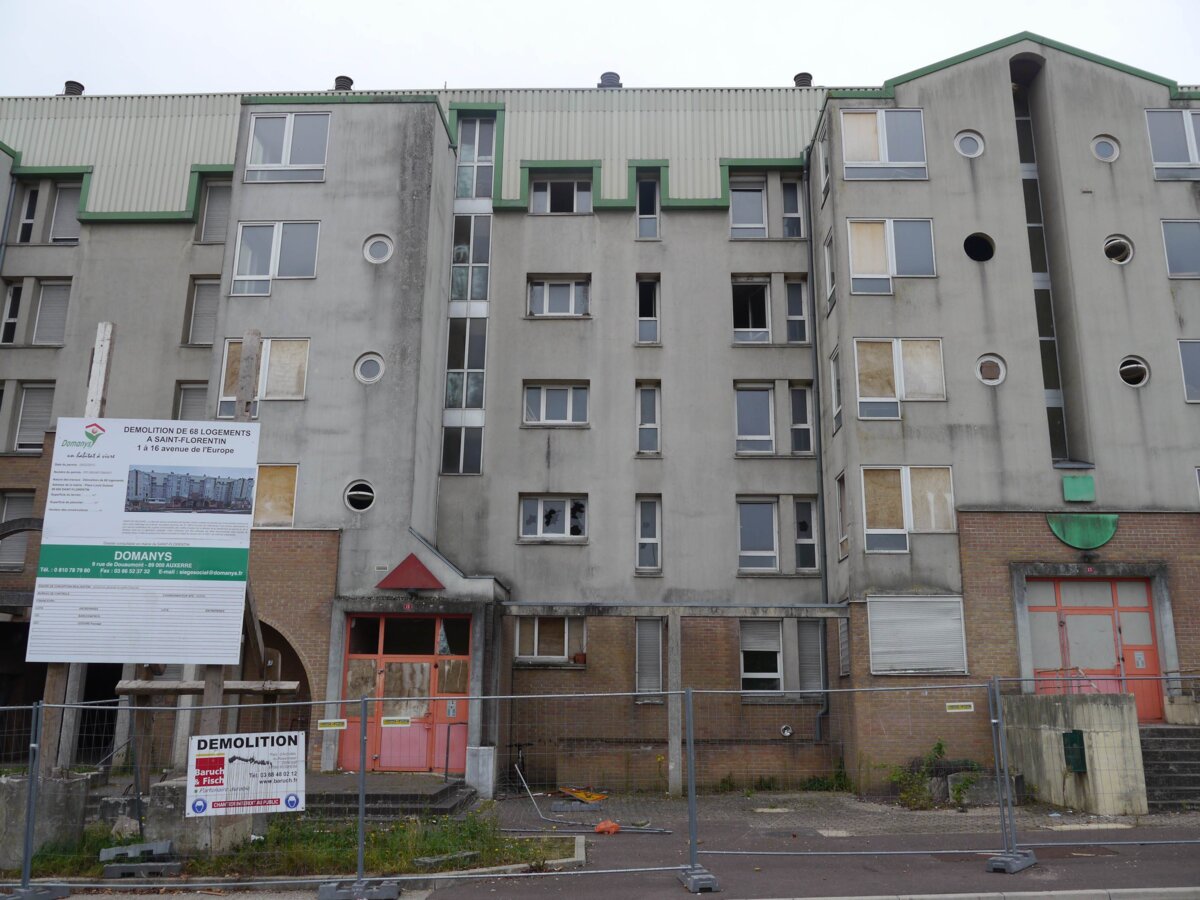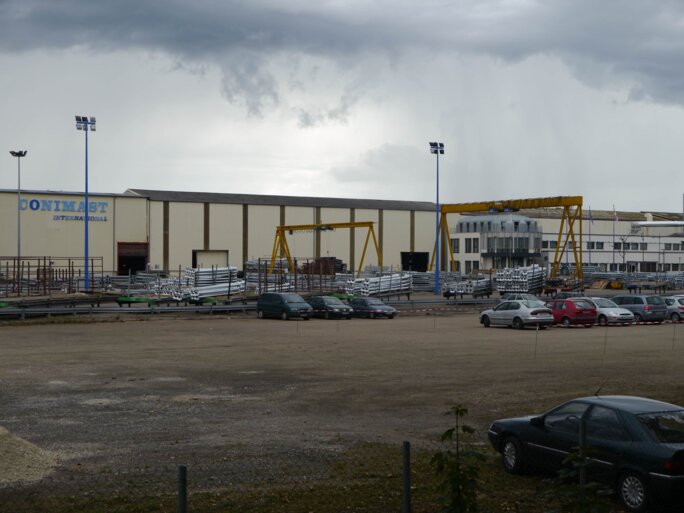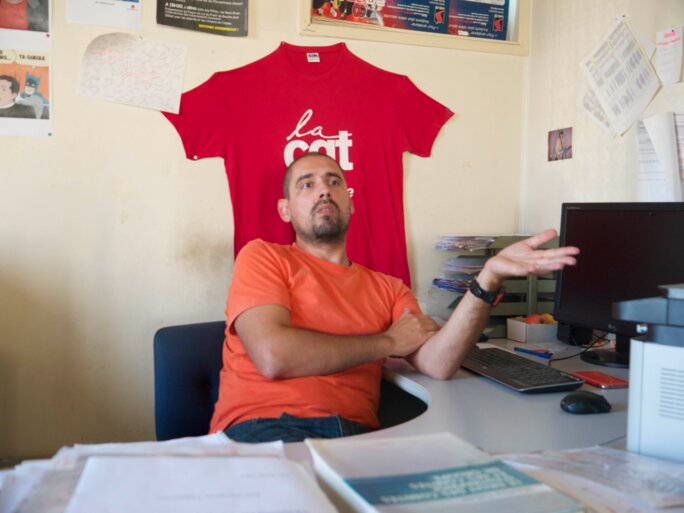Its last remaining inhabitants are swallows. Next spring the block of council flats that stands on avenue de l'Europe at Saint-Florentin in central-east France will be demolished, like many others before it. Apart from protected migratory birds, the building has been uninhabited for years and has stood as a grim symbol of an era that has all but vanished; the days when Saint-Florentin was a working town and proud of it.
That was the time, too, when the local industries, mostly based around metallurgy, were so short of staff that they went in search of workers on both sides of the Mediterranean. Some Spaniards came, and Portuguese, too, but above all Moroccans. “On the regional news they used to say: 'Saint-Florentin, the second most cosmopolitan town in France after Marseille',” recalls Éric (not his real name), who at 52 has spent half of his working life in a plant nursery, the other half in a factory making fire extinguishers.

Enlargement : Illustration 1

Saint-Florentin, often known as 'Saint-Flo' for short, is in the Yonne département – roughly akin to a county - in the Burgundy region in eastern France and lies 30 kilometres north of the major town of Auxerre. The only access is by local departmental roads or via the TER regional train station which is 1 hour 45 minutes from Paris. The town itself is undergoing something of a transformation. In the centre they are cleaning the façades of the half-timbered buildings and renovating the charming medieval streets while below, on the banks of the Burgundy Canal, the remaining high-rise blocks of council flats that are still occupied are on the point of being destroyed or being put to new uses. There is logic to this: in thirty years the town has lost a half of its inhabitants – the last census put the population at just 4,693.
In the 1990s several factories closed down and in the early 2000s the big players in the metallurgy industry underwent a restructuring, shedding several hundred employees in the process. In a département which is no better or worse off overall than the rest of France economically, with an unemployment rate of 9.5% and a population growing by 0.3% a year, Saint-Florentin itself has seen the percentage of people without work soar to 20%.
“The Saint-Florentin area was once a burning crucible, now it's a pile of ashes with a few scattered embers,” says José Carlos Folgado, shop-floor representative of the CGT trade union at fire extinguisher makers Sicli. Indeed, now it's the turn of José Carlos's own factory to be under threat. In January 2015 the Sicli site, which dates back to 1967, is set to close its gates forever. “An immense waste,” for the union representative, who describes himself as a “child of relocation”. His parents were already working for Sicli at Saint-Ouen just north of Paris before the business moved to the Yonne forty years ago.

Enlargement : Illustration 2

The Sicli factory in Saint-Florentin was in profit from 1967 to 2012. But after losses of 600,000 euros last year, the American holding company UTC, which has owned the site and the Sicli brand since 2005, began looking for a buyer for the factory. If they are not successful it will disappear. The CGT thinks that part of its current work will be shipped off to Poland, six years after a partial relocation to China.
José Carlos Folgado accuses UTC of deliberately scuppering the factory. “They take the smallest possible margin, it's sickening,” he says. “We're in a security sector where there's a guaranteed market. The law forces customers to get equipped. And with our know-how, we make the best extinguishers in the world. A Sicli product is faultless when it leaves us and the brand has a 27% market share. In that context we told ourselves it will always survive. But the greater the certainty, the greater the disillusionment...”
In all, 81 jobs are today at risk, with management offering to transfer 27 of them to another factory in the Loiret département, two-and-a-half hours to the west. Even the most combative feel discouraged. “At the age of 52 I'm not going to find a new niche for myself in a factory. It's impossible to find a job at my age,” says Éric, who has worked at the firm for 14 years, lifting seven tonnes of used extinguishers a day to repair them, the “most profitable” business at the factory. “Retraining is for those who still have the energy and who will do temporary jobs,” he adds.
'France took in lots of people, too many for sure'
According to the local chamber of commerce, the number of temporary jobs in the Yonne has risen by 12% in a year. It has become the standard option for all those who have left full-time jobs in La Saunière, the name of Saint-Florentin's old industrial area. For with 57% of those in work locally employed either by the town itself or by metallurgy firms, there is still some life left in local industry. Just across from Sicli is the Conimast factory, owned by Yves Delot, the local mayor from the right-wing UMP party, which specialises in urban lighting. That company employs 200 people, while nearby Alcan France Foundation, which makes aluminium profiles, has a staff of 300.
“If you look you can find something. Temporary jobs are ok but you can't afford to be too particular,” says Abdel, 43, who came to Saint-Florentin at the age of two with his Moroccan parents. He was dismissed from Alcan in 2005 after a row with his foreman. “In the past if you didn’t like your job in the morning, you went and knocked on the door of the factory opposite in the afternoon and they'd hire you,” he remembers. “We thought things would go on like that forever and perhaps I was a bit stupid at times.”
Abdel, who has a background in the building trade and who has been in temporary work for ten years, tried unsuccessfully to find a full-time job in Montpellier in southern France before coming back to Saint-Florentin in 2012. Sitting at a table in an almost deserted bar, he admits he “asks himself questions about France”.
As the son himself of immigrants, Abdel notes dispassionately: “There isn't work for everyone. France took in lots of people, too many for sure. At the time my father was a miner in Morocco, they came expressly to look for him.” Having been on the dole for four months already this year, Abdel has given himself another fortnight to find temporary work before he heads off to try his luck on building sites around Paris. “It's not easy but sometimes you can live in bungalows on the sites.”

Enlargement : Illustration 3

The last temporary work agency in Saint-Florentin closed its doors at the start of the year. The closest ones now, as well as the nearest employment centre, Pôle Emploi, are at Auxerre, about half-an-hour away by car. Jobless people without transport can get help from a local association designed to help the unemployed, Activité services florentinois. The association has been based in what is left of the old housing estates for the last 27 years, and in 2013 placed 128 people in temporary work. Out of those, only seven have found full-time positions.
The association’s director, Isabelle Vendange, would like to see more “more flexibility” when it comes to employment regulations. “We're no worse off than others but society has changed too quickly for us,” she says. “The current jobs market is no longer adapted to people at the level of a CAP [editor's note, the vocational training qualification the Certificat d'aptitude professionnelle] The demands are too high and we exclude a lot of people who have ability, people with CACES [editor's note, the Certificat d’Aptitude à la Conduite En Sécurité which shows they can drive various workplace machines such as forklift trucks].” The association, 63% of whose clients are women, now makes up for this shortfall on the industrial front with jobs in the personal services sector. The population of central Yonne is ageing and the services sector is undergoing a boom. Just a few years ago the association found 70% of its work contracts through local businesses. Now it works mostly with local authorities, old people's homes and individuals. “The service trades are good but they don’t provide a full-time salary,” notes Isabelle Vendange.
In one of the three town centre bars still open – ten years ago there were eight – a stocky man in a khaki tee-shirt gets worked up when he overhears a conversation about jobs in the region. “Let's stop complaining, there's work. You just have to accept anything,” he says. He is a heavy plant driver who has been in temporary jobs for “at least 20 years”, regularly picking up work in Saint-Florentin, then in Sens, Migennes and Auxerre in a 30-kilometre radius. “Of course you mustn't take any old position either, but at least all those that you can apply for. I even take small factory jobs if I have to, though I don't bother to go for below eleven euros an hour.”
'My children tell me politicians can't do anything...no doubt they're right'
The temporary worker doesn't want Mediapart to publish his name or those of his various employers, as “here, people get to know each other quickly, I'm not mad”. Recently this experienced driver, who has worked for a large construction firm, has begun to “work on the black” because, he says, “it's become really tough in the last year”. His scooter has been out of action for a month and he now uses the département council's bus, which costs two euros for a return trip to Auxerre, and which provides three services a day. When the bus timetable does not meet his needs, the worker does a deal with a school bus driver and then walks the rest of the way to work. “If you don't know how to sort things out in the countryside, you're dead,” he says.
Sort things out, and on your own, too. The attitude of the workers in the town irritates the trade unions in their office at the Sicli factory. “The mechanisms of solidarity have broken down, sometimes even we don't manage to work together,” regrets Éric, who has already witnessed five redundancy plans at the business. “When a guy's gone through that once, twice, three times... he says to himself one day it will be my turn, and he accepts it and gives up. People are worn down.”
Éric's mother worked in the same factory in the 1960s, which at the time made fridges on the assembly line, before the arrival of Sicli. Sitting on the lawn at the entrance to the warehouse loading platform, a few hundred metres from the TER train station, he describes with bitterness Saint-Florentin's slow industrial decline, something he considers a waste. “Just two years ago you could receive deliveries to our platforms directly by rail. Since then the points have disappeared.” The high-speed Paris-Lyon-Marseille TGV train crosses this area, which has a rich railway heritage. But it has never stopped there, nor indeed does it currently stop anywhere else in the département.
Éric and his friends attack the way they have been, as they see it, abandoned by the state. In his union office José Carlos Folgado waves a letter, addressed to the département prefect in March, in which he asks about the 2.3 million euros received in 2014 by Sicli's parent company Chubb France under the government's new CICE tax credit scheme, which is supposedly designed to encourage local firms to hire workers. During an informal discussion about this he was told: “What do you expect? It's globalisation.”
Next to him is another employee Jean-Luc, who has long greying hair and a cigarillo dangling from his lips. He points to the way Europe has developed since the Maastricht Treaty and the end of controls on the movement of capital. “Up to 2004-2005, with parity between the euro and the dollar, things were still ok,” he says. “The problems started when the euro started to climb and as the countries from the East joined the EU. It's a strange coincidence, isn’t it?”
In this commune that has been ruled by the Right since World War II, 70% of the electors stayed away from the voting booths during May's European elections. “My children say to me, why do you want us to vote? They [the politicians] can't do anything. I try to do my best to convince them...but in the end, no doubt they're right,” says Alain. He has worked at Sicli for 32 years and has one idea in mind: “To work here for two more years and reach retirement with a flourish.” The tears start to well up when he voices his concerns out loud.

Enlargement : Illustration 4

José Carlos wants to banish this morose atmosphere for good. He has convinced a handful of employees of his plan to take over the firm's activities as a SCOP (société cooperative et participative), a form of workers' cooperative. His aim is to maintain jobs and avoid the need for laid-off workers to go hunting for temporary work. So rather than staff getting a “fat cheque” when they leave, José Carlos Folgado is seeking an agreement with UTC to make the Saint-Florentin site an assembly factory, and its employees a credible subcontractor.
The union representative says it would need at least “thirty employees” to kick-start his bid to restore the not-so-distant past days when workers would happily “drive around around with Sicli stickers on their cars”. So far Sicli's management say simply they are “listening” without, says a company spokesman, having found any alternative plans. And if the plan fails to get off the ground? José Carlos “still believes” in it. But, and it is a sign of the prevailing mood in the factory and the town, he also hints about retraining as an auxiliary nurse.
--------------------------------------------------------------------
English version by Michael Streeter


